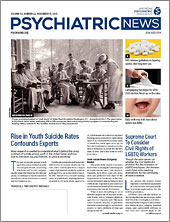Last month the United States Supreme Court heard arguments in a trio of cases with potentially sweeping implications for the LGBTQ population. All three cases ask the justices to decide whether the protections under Title VII of the Civil Rights Act of 1964—which prohibits employee discrimination based on race, religion, national origin, and, particularly relevant in this case, sex—should apply to the country’s millions of lesbian, gay, bisexual, transgender, and questioning/queer employees.
“We’ve taken it as axiomatic that gender discrimination is illegal, but the idea that those protections should also be extended to transgender individual or people of different sexual orientations would really broaden the protections,” said Marvin Swartz, M.D., chair of APA’s Committee on Judicial Action. “It would have widespread repercussions.”
In Bostock v. Clayton County and Altitude Express v. Zarda, which have been consolidated, Gerald Lynn Bostock and the estate of Donald Zarda argue that both men lost their jobs due to their sexual orientation. Harris Funeral Homes v. EEOC involves Aimee Stephens, a transgender woman, who was fired after informing her boss of her gender transition.
Lawyers for the employees largely used textualism, a style promoted by Justice Antonin Scalia, to argue their case. They claimed that, regardless of what Congress intended when it passed the Civil Rights Act, discrimination against LGBTQ employees is ultimately discrimination based on their sex and thus prohibited under Title VII.
“When a[n] employer fires a male employee for dating men but does not fire female employees who date men, he violates Title VII,” Pamela Karlan, Bostock and Zarda’s lawyer, told the court on October 8. “The employer has, in the words of Section 703(a), discriminated against the man because he treats that man worse than women who want to do the same thing.”
David Cole, a lawyer with the American Civil Liberties Union arguing on behalf of Stephens, made similar points. He told the justices that Harris Funeral Homes discriminated against Stephens because it “fired her for identifying as a woman only because she was assigned a male sex at birth. In doing so, it fired her for contravening a sex-specific expectation that applies only to people assigned male sex at birth.”
The opposing side, however, argued that sexual orientation and gender identity are independent and distinct from a person’s sex, and so Title VII does not apply. At odds with the textualist argument is the question of Congress’s intentions when it passed the Civil Rights Act. Justice Neil Gorsuch expressed concern about “the massive social upheaval that would be entailed” if the court rules in favor of the employees. He considered the possibility that the question before the court might be more appropriate as a legislative rather than judicial issue.
Justice Samuel Alito echoed those sentiments. He said whether Title VII should apply to sexual orientation “is a big policy issue, and it is a different policy issue from the one that Congress thought it was addressing in 1964.” Since the Civil Rights Act was passed, there have been numerous attempts in Congress to expand Title VII to explicitly apply to LGBTQ workers, but to no avail.
Jack Drescher, M.D., who served on the DSM-5 Work Group on Sexual and Gender Identity Disorders and is a clinical professor of psychiatry at Columbia University, said people within the LGBTQ community are worried. “They’re afraid that the Supreme Court will decide that it is going to be OK to discriminate against LGBTQ people, not because it’s fair but because the current makeup of the Supreme Court is not seen as favorable to the notion of rights for LGBTQ people.”
Though many conservative judges advocate for textualism, after the oral arguments the justices appeared largely split on ideological lines. The three cases are the first involving LGBTQ rights since the retirement of Justice Anthony Kennedy, who was often the court’s swing vote on gay rights cases and wrote the opinion in the case that guaranteed marriage equality. It’s unclear if another justice will act as a swing vote in this case.
If the justices find that Title VII does not apply to LGBTQ workers, it could potentially impact health care access for the LGBTQ population as well. Such a decision might mobilize the community to advocate for anti-discrimination laws at the state level, Drescher said. According to the Human Rights Campaign, only 22 states, Washington, D.C., and two territories (Guam and Puerto Rico) have laws prohibiting employment discrimination based on sexual orientation and gender identity, and one state prohibits discrimination on sexual orientation only. ■
Transcriptions of the arguments are posted
here and
here. Information on states with and without employment anti-discrimination laws is posted
here.
